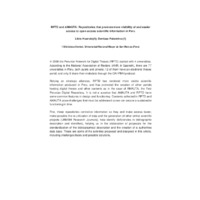RPTD and AMAUTA: Repositories that promote more visibility of and easier access to open access scientific information in Peru
Metadata
RPTD and AMAUTA: Repositories that promote more visibility of and easier access to open access scientific information in Peru
In 2008 the Peruvian Network for Digital Theses (RPTD) started with 4 universities. According to the National Association of Rectors (ANR, in Spanish), there are 77 universities in Peru, both public and private; 12 of them have an electronic theses portal, and only 9 share their metadata through the OAI-PMH protocol. Relying on strategic alliances, RPTD has rendered more visible scientific information produced in Peru, and has promoted the creation of other portals hosting digital theses and other contents as in the case of AMAUTA, the First Peruvian Digital Repository. It is not a surprise that AMAUTA and RPTD have some common features in design and functioning. Contents collected in RPTD and AMAUTA pose challenges that must be addressed so we can secure a sustainable functioning in time. First, these repositories centralize information so they and make access faster; make possible the re-utilization of data and the generation of other online scientific projects (UNMSM Research Journals); help identify deficiencies in bibliographic description and identifiers, helping us in the elaboration of proposals for the standardization of the bibliographical description and the creation of a authorities data base. These are some of the activities proposed and designed in this article, including challenges faces and possible solutions.
2012


